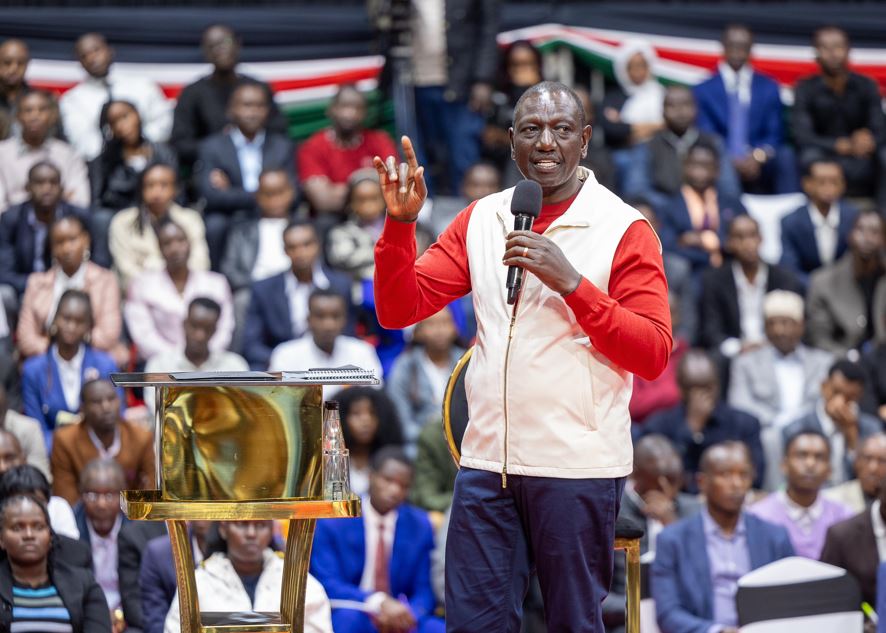University students to stage nationwide protests on Monday over new funding model

Kenya University Students Association (KUSA) Secretary General, Bonface Ododa, issued a call to action in a letter addressed to all university students, urging them to participate in the demonstrations.
University students from various institutions across the country have announced plans to hold nationwide protests on Monday, September 9, 2024, to oppose the newly implemented higher education funding model.
Kenya University Students Association (KUSA) Secretary General, Bonface Ododa, issued a call to action in a letter addressed to all university students, urging them to participate in the demonstrations.
More To Read
- Kenya’s public schools on the brink amid illegal fees, funding shortfalls
- KUPPET proposes overhaul of funding, abolition of bursaries in fresh push for fully free public education system
- Ruto affirms commitment to free, quality primary and secondary education despite budget strain
- Universities Fund faces Sh9.6 billion deficit as pending bills soar to Sh72.2 billion
- Kenya's public universities 'staring at collapse' without urgent reforms, PS warns
- MPs demand Sh5.9 billion budget reallocation for national exams amid Treasury cuts
"I am writing to inform you about the planned nationwide demonstration scheduled for Monday, September 9, starting at 9.00 a.m. I urge every student leader across the country to mobilise their constituents and join us in making our voices heard. It is time to communicate with the government in a manner they will comprehend," Ododa said.
The protests have been organised in response to several issues students face under the new university funding structure, which has heavily impacted new first-year students.
A key issue, according to Ododa, is the categorisation of students into different funding bands based on their financial needs.
Many students who applied for support under the bands offering the highest government assistance were instead placed in bands with significantly less funding.
Currently, Band 1, which provides the highest level of government support, is reserved for families earning up to Sh5,995 per month. Band 2 includes families with incomes up to Sh23,670, Band 3 covers families with monthly incomes up to Sh70,000, Band 4 is for families earning up to Sh120,000, while Band 5 applies to those earning above Sh120,000.
Ododa argued for a reduction in the number of funding bands to better reflect the socioeconomic realities of the country.
"The current five-band funding model should be reduced to three. Kenya is a developing nation with three distinct socioeconomic classes: the poor, the middle class, and the wealthy. The funding model must reflect this reality," he said.
In addition to funding adjustments, students receive loans and upkeep allowances based on their family income levels.
However, the students are demanding reforms to the repayment terms, specifically calling for an extended grace period for loan repayments to allow graduates more time to secure employment before beginning repayments.
Ododa emphasised that scholarships should be increased and loans minimised to prevent students from being burdened with excessive debt post-graduation.
Another major concern raised by students is the Means Testing Instrument (MTI), a tool used to assess families' financial capacity and categorise students into the different funding bands.
The MTI has faced criticism for inaccuracies that have resulted in widespread misclassification, leaving many students who require the most assistance struggling to afford their education.
"The MTI must be revised to address its current flaws and inaccuracies in assessing students' financial needs," he said.
The students are also pushing for a reduction in the Higher Education Loans Board (HELB) interest rates, from the current four per cent to 2.5 per cent.
"Let us stand united in this cause to secure a better future for all students," Ododa said.
First-year students who have been sent home due to lack of fees have also been urged to report their cases to the student body
"We are urging those being sent home due to lack of fees to contact us. We will liaise with their respective universities to address the matter once and for all after the mourning period following the Hillside Endarasha Academy fire tragedy,” he said.
The protests, dubbed the "Tisa Tisa demonstrations," are expected to attract students from major institutions including Kenyatta University, Mount Kenya University, Kenya Methodist University, South Eastern Kenya University, and the Technical University of Mombasa.
Top Stories Today











































